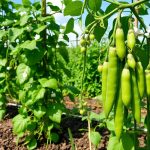Did you know there are over 60 leek varieties grown worldwide? This makes leeks one of the most varied vegetables. In the UK, we have a wide range of leek types to pick from. Leeks are a favourite in British gardens, adding a unique taste to our meals. They also look elegant with their white shanks and green leaves.
In this guide, we’ll look at the many leek varieties in the UK. We’ll explore their growing needs and how versatile they are in cooking. Whether you’re a seasoned gardener or new to it, knowing about British leek varieties types can make gardening better. We’ll use the RHS Growing Guides for tips on growing these tasty veggies. Let’s start our journey into the world of leeks!
Key Takeaways
- Leeks belong to the onion family and have a mild flavour.
- Over 60 leek varieties are available globally, with numerous options in the UK.
- Proper preparation and care are essential for successful leek cultivation.
- Leeks thrive in cool weather and require adequate sunlight.
- Knowing the right harvesting time can improve yield and quality.
📢 Watch how to Grow and Care for Leeks on YouTube with our helpful guide (Opens in new tab)
Introduction to Leeks
Leeks are a key ingredient in many British dishes. They are loved for their unique taste and health benefits. These vegetables grow tall and have tightly wrapped leaves, forming a stalk instead of a bulb.
Leeks are easy to grow and don’t need much space. They thrive in rich soil and prefer moist conditions. Sowing seeds is simple, and they can be planted indoors or outdoors at different times.
Leeks take about four to five months to grow. They are one of the last vegetables to be harvested before winter. To keep the soil moist, mulching with straw is helpful. Regularly hoeing weeds is also important.
Choosing the right leek variety is key. Varieties like Pandora, Giant Winter, and Bandit are recommended. Growing leeks not only improves my cooking but also makes my garden more vibrant and sustainable.
| Aspect | Details |
|---|---|
| Sowing Periods | Indoors: January-March, August; Outdoors: March-December |
| Harvest Times | Fresh harvests: March, August-December; storage available |
| Growth Preferences | Rich soil, well-rotted compost, moisture-retentive yet well-drained |
| Planting Method | Sow 200-300 seeds per metre, transplant when pencil thick |
| Spacing | 15x30cm when planting |
| Maintenance | Regular hoeing, occasional watering during dry spells; low disease resistance |
Understanding Leek Varieties UK
Exploring UK leek breeds is fascinating. Each variety has unique traits and growing needs. These differences cater to various gardening styles and culinary preferences. Let’s look at some popular leeks that grow well in British gardens.
Giant Winter
The Giant Winter leek is known for its strength and hardiness. It’s perfect for winter harvests. Its long white stems can handle the cold, making it a top choice for late-season crops.
Elefant
The Elefant leek stands out with its thick shank and large size. It offers a generous yield and robust flavour. This makes it ideal for hearty dishes.
Lyon (Prizetaker)
The Lyon, or Prizetaker, is a well-known UK leek breed. It’s celebrated for its flavour and tenderness. This variety is a favourite among home cooks for its beauty and taste.
Musselburgh
The Musselburgh leek is a traditional favourite. It’s known for its reliable performance in the garden. It produces long, thick shafts with a rich flavour, making it a staple in British dishes.
Lancaster F1
The Lancaster F1 is a hybrid variety. It’s known for its disease resistance and long harvest period. This makes it a great choice for gardeners looking for a consistent and healthy crop.
Bulgarian Giant
The Bulgarian Giant leek thrives in colder climates. It’s known for its impressive size and yield. This variety is perfect for those in cooler UK areas, showing the diversity of leek varieties.
Carentan
The Carentan leek is loved for its delicate flavour and tenderness. This French variety adapts well to British soils and conditions. It offers more culinary options for gardeners.
Popular British Leek Types
Exploring British leeks shows a variety of delightful types. Knowing the popular ones helps gardeners choose the right ones. This section looks at winter and early spring varieties, perfect for different seasons.
Winter Varieties
Winter leeks are tough and taste great even in cold weather. They grow well in cold climates. Here are some top winter leeks in Britain:
- Bleu de Solaise – It has beautiful blue-green leaves and tastes great.
- Monstrueux de Carentan – This leek is big and loves cold weather, making it perfect for winter.
- Saint Victor – Great for keeping through winter, it tastes sweet and has a nice texture.
- Long Giant Greek – It’s long and tasty, making it a great winter addition to meals.
- Giant Bulgarian – It’s big and looks great, making it a treat for the eyes and taste buds.
- Mézières Long Winter – It tastes great and is versatile in cooking.
Early Spring Varieties
For those who want to start planting early, Britain has great leek varieties. They germinate in spring for a tasty summer harvest. Here are some top early spring leeks:
- Copenhagen – It’s reliable, tastes great, and is consistent all season.
- Jaune de Poitou – It’s yellow and looks amazing in gardens, adding a special touch to dishes.
To grow British leeks, you need good soil, regular water, and watch out for pests. Follow RHS tips for the best results. Growing different leeks adds variety and flavour to your garden.
The Many Kinds of Leeks in Britain
In Britain, leek varieties show a mix of old and new. These types have changed a lot over time. This change is thanks to both old farming ways and new gardening ideas. Urban gardening has led to the creation of new leek types that are loved by many.
How leeks grow depends a lot on the environment. The soil and weather affect their taste, size, and how much they grow. For example, some leeks grow well in heavy soil, like Navajo, which is known for its big roots.
When growing leeks, picking the right way to plant and when to do it is key. It’s best to plant in March and April for the best results. Some leeks, like F1 hybrids, are great because they grow a lot and don’t get sick easily. I find that planting leeks directly in beds works well for strong plants.
Leeks from Britain are great for cooking because they taste different. Whether they are tall and thin or short and fat, they add special flavours to food. This makes British food even better. Joining community gardens helps people learn about and enjoy these different tastes in their cooking.
📢 Watch how to Grow and Care for Leeks on YouTube with our helpful guide (Opens in new tab)
Conclusion
Exploring leek varieties in the UK opens up a world of tastes and uses, great for any garden. From the strong Giant Winter to the impressive Bulgarian Giant, each has its own perks. Knowing these leek types in Britain makes our cooking better and helps pick the best for our area’s weather and soil.
Adding leeks to my garden shows their value, packed with vitamins and minerals for health. They help keep blood sugar low and might fight cancer. Growing leeks well means using the right methods, local tips, and always learning more.
If you want to learn more, check out RHS guides and join local gardening clubs. They offer great advice and tips on growing leeks and other veggies. Growing my own leeks connects me to nature and brings me the joy of eating food I grew myself.
✅ Take a look at my guide for growing Leeks
FAQ
What are the best leek varieties to grow in the UK?
How long does it take for leeks to grow before harvesting?
Can I grow leeks from seed?
What are the nutritional benefits of leeks?
How do I prepare the soil for growing leeks?
When is the best time to plant leeks in the UK?
What makes leeks a suitable crop for winter gardening?
What Next?
👇🏼 Let me Guide you through the season “NEWSLETTER” ✅ Always know what to sow and when, your full guide to the growing season. (Monthly Newsletter) Simple easy to follow (No Fluff, Spam or filler) just good advice. https://veggiepatchideas.substack.com/
✅ Helpful links
- Take a look at my Amazon store front for guides and product reviews of the things that you need.
- RHS: facts about grow your own Click here
- Just starting your veggie patch? Start here with our beginners guide
- Problems on the allotment? Remove Couch Grass or Remove Bindweed
- Looking for an allotment in the UK? Try searching here first GOV.UK
- The national allotment society Click Here
- Other sites we love Gardeners world


